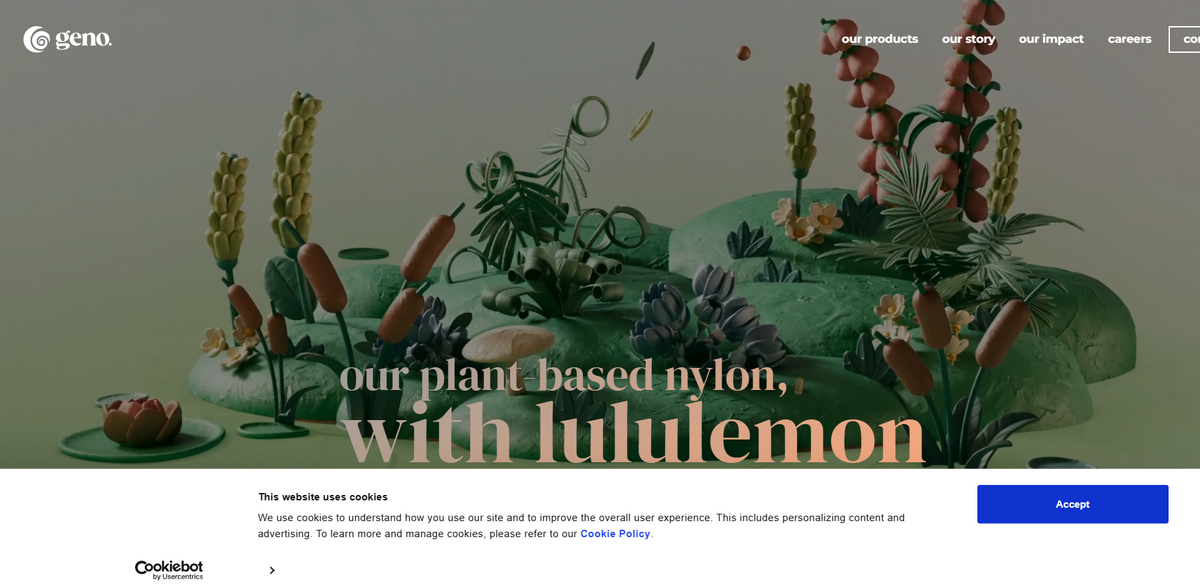Introducing the Sustainable Source
The project centers on plant-based nylon that is redefining modern materials – a true milestone in sustainable innovation. Geno, the Sustainable Source™, is accelerating the world’s transformation to sustainable materials by replacing fossil fuel sources with plants. This initiative is built on the belief that all products should be responsibly sourced, traceable, and transparent. For over a century, fossil fuels have provided the building blocks for many everyday molecules, from the clothing we wear to the ingredients we use on our skin. Now, by creating the same molecules, ingredients, and materials from plant sugars and other sustainable sources, the project is breaking free from the deep fossil fuel dependency that has defined modern life… It’s a revolution in material science that’s both dynamic and promising.
Main Benefit & Key Figures
The tangible benefits of this technology leave a lasting impact – both environmentally and economically. Key figures that outline the project’s significant strides include:
- Capacity to reduce up to 85M tons of carbon per year.
- Up to 90% lower carbon emissions compared to traditional fossil fuel methods.
- An estimated $4T global market opportunity in the transition to sustainable materials.
- A $22 billion market shift in nylon production, exemplified by Lululemon’s first-ever equity investment in a sustainable materials company.
- A disruption of a $61 billion/year palm oil market, offering traceable replacements for various consumer product ingredients.
Breaking Fossil Fuel Dependence
For decades, products made from fossil fuels have shaped modern lifestyles. From the fabric in apparel to vital chemicals in everyday items, fossil fuels have been pervasive. However, fossil fuels such as crude oil and coal once powered our modern conveniences but now face environmental and geopolitical challenges that necessitate a change. Geno’s technology enters the scene as a game-changer – creating sustainable alternatives to these age-old components. Day by day, the reliance on fossil-based feedstocks is being replaced with plant-derived solutions that not only promise lower carbon footprints but also offer the transparency that modern consumers demand. It’s like witnessing a turning point in history… a moment when tradition meets innovation.
Transforming Industries with Innovation
Geno’s technology covers a broad spectrum of products, powering high performance at a leading scale. The transformation begins with materials like Geno’s plant-based nylon, which is already disrupting the conventional fossil fuel-based nylon industry. Lululemon’s partnership is a vivid example where high-performance athletic apparel is transitioning to this innovative material. The portfolio also includes breakthrough ingredients such as Brontide® butylene glycol. This multifunctional component for personal care products enhances texture, improves antimicrobial efficacy, and reduces global warming potential by more than an estimated 50% compared to its petroleum-based counterpart. In the personal care arena, Avela™ natural (R)-1,3 Butanediol stands out as a ketogenic ingredient produced using proprietary fermentation. And then, for the chemical intermediates found in everyday materials – from spandex to plastics – Geno’s renewable bio-BDO process technology replaces conventional fossil-based BDO. The portfolio is diverse because sustainable innovation isn’t a one-trick pony; it’s an ecosystem of change.
Driving a Traceable Supply Chain
A noteworthy aspect of the project is its commitment to shaping transparent, traceable, and responsible global supply chains. This isn’t merely about switching ingredients; it’s about redesigning the entire supply framework for the world’s largest brands. Traceability ensures that every component can be tracked back to its sustainable origin, offering reassurance to consumers and brands alike. This level of transparency builds trust, ensuring that sustainability is not an afterthought but a core feature of each product. By enabling brands to finally look under the hood of their supply chains, the project creates a ripple effect, promoting ethical practices and responsible sourcing on a global scale.
Unlocking Market Opportunities Through Sustainable Design
The project taps into a $4T market opportunity by re-imagining the ingredient landscape for a variety of industries. It doesn’t merely offer a greener alternative to fossil fuel-based production but accelerates market transitions. By developing well-known, large-scale commodities and specialty ingredients, the approach guarantees that sustainability and economic benefits can go hand in hand. This vision is further solidified with the introduction of sustainable replacements in sectors like personal care, beauty, home care, and even industrial cleaning. Detailed innovation such as Geno performance bio-specialties is the blueprint for creating high-performing, cost-effective fragrances while significantly reducing sustainability footprints. It’s an approach that resonates with both environmental imperatives and market demands.
Project Impact on Global Sustainability
- SDG 9: Industry, Innovation, and Infrastructure – Encouraging revolutionary industrial processes.
- SDG 12: Responsible Consumption and Production – Paving the way for transparent and ethical sourcing.
- SDG 13: Climate Action – Drastically lowering carbon emissions and fighting climate change.
- SDG 7: Affordable and Clean Energy – Shifting the dependency from fossil fuels to sustainable energy sources.
- SDG 15: Life on Land – Promoting sustainable practices that benefit the natural environment.
The Future of Sustainable Materials
Looking ahead, the project’s impact on the global transition to sustainable materials is clearer than ever. It continues to drive material innovation that benefits industries, brands, and consumers, ensuring that the transition away from fossil fuel dependency is both rapid and scalable. By harnessing plant power and unlocking the potential of previously untapped natural resources, the project signals a promising path forward – where environmental responsibility and high performance are not mutually exclusive. In today’s fast-paced world, this venture offers a breath of fresh air… a dynamic blueprint for how sustainability can redefine modern living, empower responsible production, and secure a greener future for generations to come.


















